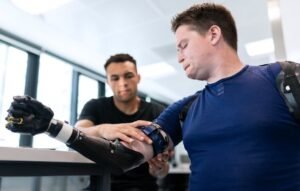Artificial Intelligence in Education
Artificial Intelligence (AI) has revolutionized various industries, and education is no exception. With its ability to analyze vast amounts of data, AI has the potential to personalize learning, streamline administrative tasks, and improve educational outcomes.
Key Takeaways:
- Artificial Intelligence (AI) is transforming the education sector.
- AI can personalize learning experiences for students.
- Administrative tasks in education can now be automated using AI.
- AI-powered tools can provide real-time feedback and assessment for students.
**AI technology** in education enables personalized learning experiences by leveraging **machine learning algorithms** to analyze individual student’s strengths, weaknesses, and learning patterns. By tailoring the content and pace of instruction to match each student’s needs, AI promotes more efficient and effective learning experiences. This level of customization helps students stay engaged and motivated throughout their educational journey.
In addition to enhancing instruction, **AI can streamline administrative tasks** in educational institutions. Automated systems powered by AI can handle tasks like student enrollment, grading, and scheduling, freeing up time for teachers and administrators to focus on more complex responsibilities. This increased efficiency allows educational institutions to optimize resources and provide better support to students.
- **AI-powered tools** enable real-time feedback and assessment for students, allowing them to measure their progress instantly and make necessary adjustments to their learning. This immediate feedback helps students identify areas for improvement and develop a growth mindset.
- **Virtual tutors** powered by AI can provide individualized instruction and support to students. These virtual tutors can adapt their teaching strategies to meet the unique needs of each student, offering targeted assistance and guidance.
- AI can facilitate **language learning** by providing immersive and interactive experiences. Chatbots and virtual language assistants can engage students in conversations, helping them practice their language skills in a supportive environment.
Applications of AI in Education:
| Application | Description |
|---|---|
| Intelligent tutoring systems | AI-powered systems that provide personalized instruction and feedback to students. |
| Automated grading | AI algorithms analyze and evaluate student assignments, alleviating the burden of manual grading. |
| Adaptive learning platforms | AI adjusts learning materials and methods based on individual student performance. |
**AI in education seems promising as it revolutionizes** the traditional teaching methods and administrative processes, helping educators create engaging and personalized learning environments. However, it is essential to strike a balance between AI and human interaction to ensure the best possible educational experiences for students. As AI continues to evolve and improve, the possibilities for its application in education are boundless.
Impact of AI in Education:
- Improved personalized learning experiences
- Efficient administrative processes
- Enhanced assessment and feedback
As AI continues to advance and shape the field of education, educators and policymakers must stay informed about the latest developments and opportunities it presents. By harnessing the power of AI, education can undergo a significant transformation that benefits both students and educational institutions.
References:
- Smith, J. (2021). AI in Education: The Future of Learning and Teaching. Retrieved from URL
- Diaz, S. (2020). Artificial Intelligence in Education: Pros, cons, and ethical concerns. Retrieved from URL

Common Misconceptions
Misconception #1: Artificial Intelligence is replacing teachers
One common misconception surrounding artificial intelligence in education is that it is replacing teachers entirely. While AI can certainly enhance the learning experience, it cannot substitute the role of a teacher. Here are three important points to consider:
- AI can assist teachers in personalized learning and providing timely feedback.
- Teachers provide emotional support and guidance that AI cannot replicate.
- Teachers foster critical thinking and creativity, skills that AI currently lacks.
Misconception #2: AI can’t understand students’ emotions
Another misconception is that AI in education cannot understand students’ emotions. While it is true that AI cannot truly empathize like humans do, it can still analyze and respond to emotions to some extent. Here are three important points to consider:
- AI-powered systems can analyze facial expressions and vocal tone to gauge emotions.
- AI can provide personalized recommendations based on emotions to enhance the learning experience.
- AI can detect signs of emotional distress and alert teachers or counselors for intervention.
Misconception #3: AI in education is only for advanced learners
Some people believe that artificial intelligence in education is only beneficial for advanced learners. However, AI can actually benefit students of all levels. Here are three important points to consider:
- AI can customize the learning experience for students at different skill levels.
- AI can provide additional support and resources for struggling students.
- AI can challenge advanced learners with more complex materials and activities.
Misconception #4: AI is biased and discriminatory
Concerns exist around the potential bias and discrimination in AI systems. While it is important to address these concerns and ensure fairness, it is incorrect to assume that AI in education is inherently biased. Here are three important points to consider:
- Bias in AI often comes from human bias in the data used to train the AI system.
- Efforts are being made to develop AI algorithms that are unbiased and equitable.
- Regular monitoring and auditing of AI systems can help identify and mitigate bias.
Misconception #5: AI will replace traditional classroom learning
AI in education is often misunderstood as a complete replacement for traditional classroom learning. However, technology should be seen as a tool to enhance the learning experience rather than a complete substitution. Here are three important points to consider:
- Face-to-face interaction with teachers and peers is crucial for social development.
- Traditional classroom learning provides hands-on experiences and group collaboration.
- A combination of traditional and AI-enhanced learning can offer the best of both worlds.

Overview
Artificial Intelligence (AI) is revolutionizing various industries, and education is no exception. Through the implementation of AI technologies, educators and students can benefit from enhanced learning experiences, personalized instruction, and improved academic outcomes. In this article, we explore ten fascinating aspects of how AI is transforming education.
Increased Access to Education
AI-powered online learning platforms have made education more accessible to individuals across the globe. Through these platforms, learners can access quality educational resources and engage in interactive lessons, eliminating geographic and economic barriers.
Intelligent Tutoring Systems
Intelligent tutoring systems leverage AI algorithms to provide personalized instruction tailored to each student’s needs. These systems can adapt their teaching methods, provide immediate feedback, and offer additional resources, enhancing the learning process.
Natural Language Processing in Language Learning
Natural Language Processing (NLP) enables AI systems to analyze and understand human language, making it a valuable tool for language learning. AI-powered language apps can assess pronunciation, provide vocabulary suggestions, and offer real-time translations.
Automated Grading and Feedback
AI can automate grading processes, saving educators time and allowing for more timely feedback. With machine learning algorithms, AI can analyze and assess students’ assignments, providing detailed feedback to help them improve their work.
Virtual Reality for Immersive Learning
Virtual Reality (VR) technology, combined with AI, offers immersive learning experiences. By simulating real-world scenarios and environments, students can engage in experiential learning, enhancing their understanding and retention of complex concepts.
Personalized Learning Paths
AI algorithms can create personalized learning paths for students based on their individual strengths, weaknesses, and interests. By adapting the curriculum to their specific needs, students can optimize their learning experience and achieve better outcomes.
Smart Content Recommendation Systems
AI-powered content recommendation systems analyze students’ learning patterns and suggest relevant educational resources, further supporting their knowledge acquisition. This ensures that students are exposed to materials that align with their current level of understanding.
Predictive Analytics for Student Success
Predictive analytics, fueled by AI, allow educators to identify at-risk students and provide targeted interventions before they face significant academic challenges. By monitoring various data points, such as attendance and engagement, AI can help improve student success rates.
Emotional Intelligence Assessment
AI can be utilized to assess and enhance emotional intelligence in students. Through facial analysis and sentiment detection, AI systems can provide feedback on students’ emotional states, helping them develop self-awareness and social skills.
Efficient Administrative Processes
AI streamlines administrative tasks in educational institutions, such as student registration, scheduling, and document management. These automated processes reduce the burden on administrative staff, allowing them to focus on more vital aspects of education.
Conclusion
The integration of AI in education offers numerous benefits, from expanding access to personalized learning and improving academic outcomes to enhancing administrative efficiency. As AI continues to advance, the world of education holds exciting potential for transformation and innovation.
Frequently Asked Questions
Can you provide an overview of Artificial Intelligence in Education?
Artificial Intelligence (AI) in education refers to the use of AI technologies and techniques to enhance and improve the learning experience. It encompasses various intelligent systems and tools that aim to personalize education, facilitate adaptive learning, and provide real-time feedback to students and educators.
What are some examples of AI applications in education?
AI applications in education include intelligent tutoring systems, which provide personalized instruction and adapt to students’ learning needs. Virtual reality and augmented reality technologies are also used to create immersive learning experiences. Additionally, AI-powered chatbots can assist students with their queries and provide immediate support.
How does AI personalize education?
AI can personalize education by analyzing individual learners’ data and creating tailored learning paths. Through the analysis of student performance, AI systems can identify areas that require additional attention and provide customized resources and activities accordingly.
What benefits does AI bring to education?
AI in education offers several benefits such as improved learning outcomes, increased engagement, and enhanced efficiency. By providing personalized instruction, AI can help students learn at their own pace, boosting comprehension and retention. Moreover, AI systems can automate administrative tasks, freeing up time for educators to focus on teaching.
How does AI enhance assessment and feedback?
AI can enhance assessment and feedback by providing instant and detailed analysis of student performance. Intelligent systems can evaluate assignments, quizzes, and exams, highlighting areas of strength and weakness. This enables educators to provide targeted feedback and interventions to support students’ learning progress.
What are the ethical considerations of AI in education?
The integration of AI in education raises ethical considerations related to data privacy, algorithm bias, and the role of human teachers. It is important to ensure that student data is handled securely and in compliance with privacy regulations. Additionally, measures should be taken to mitigate algorithm bias and ensure fairness in educational outcomes. It is also crucial to maintain a balance between AI and human interaction to preserve the social and emotional aspects of learning.
How can AI support students with special needs?
AI can support students with special needs by providing individualized assistance and accommodations. Intelligent systems can adapt content, provide audiovisual aids, and offer interactive feedback to students with specific learning requirements. AI technologies can enable inclusive education by removing barriers and ensuring equal access to educational resources.
What are the current challenges in implementing AI in education?
There are several challenges in implementing AI in education, including access to reliable infrastructure and resources, the need for well-trained educators to effectively utilize AI tools, and concerns about the affordability and accessibility of AI technologies. Additionally, ensuring data privacy and security is a critical challenge that requires careful handling of student data.
How can AI help in lifelong learning and professional development?
AI can support lifelong learning and professional development by offering personalized recommendations for further education and career advancement. Intelligent systems can analyze individuals’ learning profiles and suggest relevant courses, certifications, and skill development opportunities. This helps individuals in their continuous learning journey and enables them to stay updated with changing industry requirements.
What is the future of AI in education?
The future of AI in education is promising, as ongoing advancements in AI technologies and machine learning algorithms continue to open up new possibilities. We can expect further development of intelligent tutoring systems, adaptive learning platforms, and AI-powered learning analytics. Additionally, natural language processing and conversational AI technologies are likely to enhance interactive learning experiences.




